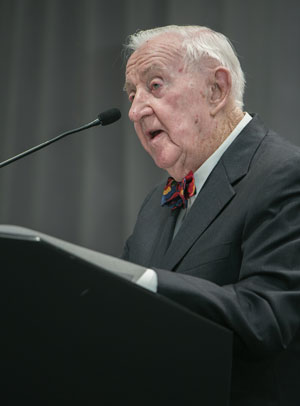John Paul Stevens praises Chief Justice Roberts' style

John Paul Stevens. Photograph by Kathy Anderson Photography.
In 2014, retired U.S. Supreme Court Justice John Paul Stevens published Six Amendments: How and Why We Should Change the Constitution. And in a short but punchy speech at a luncheon during the 2015 annual meeting, Stevens praised the current justices for taking positive steps in the direction of implementing at least some of his recommendations.
Stevens, a native Chicagoan who served on the Supreme Court from Dec. 19, 1975, as a nominee of President Gerald R. Ford, until stepping down on June 29, 2010, also singled out Chief Justice John G. Roberts Jr. for his wisdom in siding with the majority in certain key decisions and his restraint in opinions that were at odds with the views of fellow justices in other cases. “I respect his work even though I often disagree with his views,” said Stevens, who drew a pointed contrast between Roberts’ low-key opinions and the sarcasm that Stevens said Justice Antonin Scalia often directs toward other justices, sometimes even when they agree with him.
Stevens cited the majority opinion that Roberts wrote in King v. Burwell upholding key portions of the Affordable Care Act. In his opinion, Roberts avoided the temptation to focus on the specific language used by Congress in permitting federal tax subsidies available in 36 states to individuals obtaining insurance under the act. “The chief was dead right in focusing on the intent of Congress,” said Stevens, “even though the provision was awkwardly drafted.”
Stevens made his remarks during the International Human Rights Award & Passing of the Gavel Luncheon sponsored by the Section of Litigation.
RULING ‘RIGHT’
The Supreme Court’s decision upholding the right of voters to strip legislators of their authority to draw up district voting lines and its ruling that same-sex marriage is protected by the Constitution both were in accord with Stevens’ ideas on how the Constitution can be improved.
The “right to marry, like the right to abortion, fits squarely with the liberties protected by the due process clause of the 14th Amendment,” Stevens said, unlike the right to bear arms under the Second Amendment, which he said should not be protected under due process. In his book, Stevens proposes amending the Second Amendment to limit the right to bear arms to those “serving in the militia.”
Stevens said he also would like to see the court move more assertively to declare that the death penalty amounts to cruel and unusual punishment. Citing how long it takes for death penalty cases to move through the courts, Stevens said such delays alone amount to cruel and unusual punishment, and he called for “a national solution” to the death penalty issue.
Also at the luncheon, the outgoing chair of the Litigation Section, Nancy Scott Degan, a shareholder at Baker, Donelson, Bearman, Caldwell & Berkowitz in New Orleans, presented the section’s International Human Rights Award for 2015 to Claudia Paz y Paz Bailey, the first woman to serve as attorney general of Guatemala, who now is a distinguished scholar in residence at the Georgetown Institute for Women, Peace and Security.
This article originally appeared in the October 2015 issue of the ABA Journal with this headline: “High (Court) Praise: John Paul Stevens likes Chief Justice Roberts’ style.”



